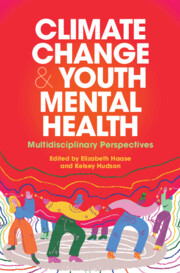Book contents
- Climate Change and Youth Mental Health
- Climate Change and Youth Mental Health
- Copyright page
- Contents
- Figures
- Tables
- Textboxes
- Contributors
- Preface and Introduction
- Considerations
- Acknowledgments
- Part I Conceptual Foundations of Climate Distress in Young People
- Part II Multidisciplinary Perspectives on Youth Climate Distress
- Chapter 10 Therapists’ Perspectives
- Chapter 11 Ecological and Intersectional Perspectives to Reduce Young Adults’ Climate Distress
- Chapter 12 Pediatricians’ Perspectives
- Chapter 13 A Legal Perspective on Judicial Remedies to Respond to Young People’s Climate Distress
- Chapter 14 Coping with Climate Change among Young People
- Chapter 15 Social-Ecological Perspectives and Their Influence on Climate Distress in Young People
- Chapter 16 Parenting and Grandparenting Our Youth in the Climate Crisis
- Chapter 17 Perspectives on Addressing Young People’s Climate Distress in Education
- Chapter 18 Activists’ Perspectives
- Chapter 19 Perspectives from Creative Spaces
- Chapter 20 Landback
- Chapter 21 Future Directions
- Appendix A Resource List for Educators
- Appendix B Costs and Benefits of Activism Scale
- Index
- References
Chapter 21 - Future Directions
Youth Climate Distress and Climate Justice
from Part II - Multidisciplinary Perspectives on Youth Climate Distress
Published online by Cambridge University Press: 06 June 2024
- Climate Change and Youth Mental Health
- Climate Change and Youth Mental Health
- Copyright page
- Contents
- Figures
- Tables
- Textboxes
- Contributors
- Preface and Introduction
- Considerations
- Acknowledgments
- Part I Conceptual Foundations of Climate Distress in Young People
- Part II Multidisciplinary Perspectives on Youth Climate Distress
- Chapter 10 Therapists’ Perspectives
- Chapter 11 Ecological and Intersectional Perspectives to Reduce Young Adults’ Climate Distress
- Chapter 12 Pediatricians’ Perspectives
- Chapter 13 A Legal Perspective on Judicial Remedies to Respond to Young People’s Climate Distress
- Chapter 14 Coping with Climate Change among Young People
- Chapter 15 Social-Ecological Perspectives and Their Influence on Climate Distress in Young People
- Chapter 16 Parenting and Grandparenting Our Youth in the Climate Crisis
- Chapter 17 Perspectives on Addressing Young People’s Climate Distress in Education
- Chapter 18 Activists’ Perspectives
- Chapter 19 Perspectives from Creative Spaces
- Chapter 20 Landback
- Chapter 21 Future Directions
- Appendix A Resource List for Educators
- Appendix B Costs and Benefits of Activism Scale
- Index
- References
Summary
The concluding chapter of this volume maps the contributions of the book as a whole, articulates possible future directions for further research, and offers a humanities lens to this conversation about youth mental health. Directions for further exploration include expanding the frame to encompass studies of affect and emotions (not just mental health), investigating the cultural politics of emotions (not just the importance of inner well-being) by situating emotions within political landscapes, enlarging the vocabulary of climate emotions (beyond the language of mental health), and queering climate emotions research.
Keywords
- Type
- Chapter
- Information
- Climate Change and Youth Mental HealthMultidisciplinary Perspectives, pp. 403 - 419Publisher: Cambridge University PressPrint publication year: 2024

